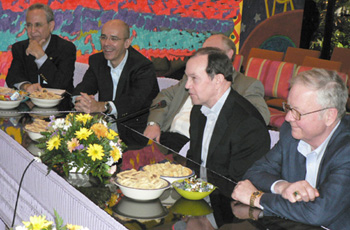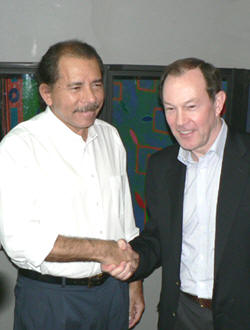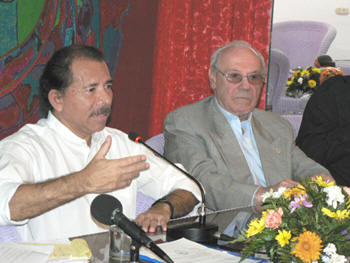|
Nicaragua
“Peace of mind for transnational corporations,” but what
about the workers?
|
During his first weeks in Office, president Daniel Ortega
met with national companies and transnational corporations,
which are investing or plan to invest in Nicaragua.
Ortega’s policy is aimed primarily at creating a climate of
stability and peace, to show the country and the
international community that his government is not driving
investment away and that Nicaragua will be a
magnificent option for foreign business operators. An
economic, but at the same time political support, that will
enable Ortega to further his government agenda
without encountering major problems.
While on the one hand this is an understandable attitude for
the new government to have, as it helps dispel the doubts
and prejudices that have surrounded the figure of Daniel
Ortega in many national and international circles, on
the other hand it is very disquieting that, to date, these
transnational corporations have not been required to make
any firm commitments regarding the human, labor and union
rights of Nicaraguan workers.
The recent arrival to Nicaragua of Warren Stanley,
president of the transnational corporation Cargill,
and his meeting with Daniel Ortega and the
presidential advisors, is yet another example of an economic
policy that has still not defined what kind of development
model this government wants to implement and what
instruments will be used to do it.
Although the new president inaugurated his administration
with the “Zero Hunger” Program – a program that
delivers production inputs to farmers so that they can
produce food, recycle anything recyclable, and quickly
overcome malnutrition – and created the Food Security
and Sovereignty Council, coordinated by the
sociologist and economist Orlando Nuñez Soto,
he has also given his full support to a company like
Cargill, whose development model is the exact opposite
of Food Security and Sovereignty, only
requiring in exchange that the investment be accompanied by
certain social aspects to the benefit of the population.
Cargill and
its philosophy
|

Cargill
Delegation |
In his book “Invisible Giant: Cargill and its
Transnational Strategies” the economist and theologian
Brewster Kneen describes Cargill as “an
agribusiness, food and financial complex that operates in 72
countries, including several Latin American ones. This
“empire,” founded some 140 years ago by William
Cargill, is much more powerful than Monsanto’s.
It employs 80,000 workers distributed throughout the planet
and its activities include marketing, manufacturing and
distributing agriculture, food, financial and industrial
goods and services. Cargill is the prototype of the
corporations that dominate the world’s economy today. In the
year 2000, these corporations accounted for 12 percent
of the world’s Gross Domestic Product, moving approximately
3.5 billion dollars.”
This company’s philosophy was spelled out by its former
president, who upon stepping down said that “there is a
misguided belief that the greatest agricultural need of the
developing world is to reach a production capacity that will
cover domestic consumption. This is a mistake. Each country
must produce what it produces best and market it.” This idea
was confirmed and strengthened by the then vice president,
Robin Johnson: “breaking the siege of poverty means
going from subsistence farming to market agriculture.
Subsistence farming prevents farmers’ income from growing,
keeps populations outside the food marketing system and thus
makes them more vulnerable to natural disasters, damaging
the environment.”
In contrast, many have opted to promote subsistence farming,
family farming, and local markets, that is, everything that
goes against the Cargill model, which is the
predominant production model in the world today. According
to agricultural ecology expert Peter Rosset1
“food sovereignty is the right of all peoples to define
their own food production, distribution and consumption
system. It is the right of rural communities to access land,
to be able to produce for their own local and national
markets, to not be excluded from those markets by the
imports of the transnational corporations. It is also the
right of consumers to access food that is healthy,
affordable and culturally suitable for their cooking
practices and their country’s culinary history, and which is
produced locally. If a country is incapable of feeding its
own people, if their next meal depends on the world market,
that country is extremely vulnerable. A vulnerability that
leaves them at the mercy of the good will of the superpowers
and of market fluctuations. That’s why we talk of
sovereignty.”
|

Daniel Ortega and
Warren Stanley,
President
of Cargill |
But the problem is not just the development model, it is
also the instruments and methods that are used to implement
it. In the case of these transnational corporations, the
instruments are often the exploitation of the local
workforce and the violation of their human, labor and union
rights. Nicaragua, its new government and its
development agenda cannot afford to go down any other road
than that which leads to an employer-worker relationship
that fully respects the rights guaranteed by national laws
and international conventions.
In his meeting with Cargill’s executives, Daniel
Ortega said that “the country would provide the
guarantees and security necessary for them to continue with
their investments, because what Nicaragua needs are
long-term investments. We have been meeting with Nicaraguan
and foreign business operators and what we are asking is
that investments be accompanied by social aspects that will
contribute to combat poverty.
“We’ve had a positive reaction from all the investors we’ve
discussed this matter with. We are even holding several
meetings towards defining investment areas aimed at
generating jobs in the short-term, using national raw
materials and including social aspects that will benefit the
population. We are convinced – Ortega concluded –
that your investment in this country, the jobs it is
generating, the direct and indirect impact in economic and
social terms are all going in the way of combating poverty,
and I invite every foreign investor to join us in this
battle. Nicaragua is a country that is willing to
continue to work and expand these investments, and it is
important for you to be comfortable here, have peace of mind
and feel secure.”
What will the
cost of this peace of mind and security be?
In August 2006, the International Meeting of Cargill
Workers was held in São Paulo, Brazil, organized
by the national food workers’ confederation CONTAC/CUT
(Confederação Nacional dos Trabalhadores nas Indústrias da
Alimentação). At that event, Gerardo Iglesias, Latin
American regional secretary of Rel-UITA (International
Food Workers’ Union), declared that “at this meeting we
are making the decision to relentlessly combat this
transnational corporation which has brought back feudalism,
causing severe repetitive strain injuries (RSI) and
serious illnesses due to the intense work pace that workers
are subjected to, adopting antiunion practices and
generating serious social and environmental problems in
every country it is established.”

Daniel Ortega and
Vice President Jaime Morales
|
During a great strike called against Cargill in 2005,
the president of CONTAC, Siderlei de Oliveira,
remarked: “Cargill should be in the Guiness Book of
World Records, because what it’s capable of doing against
its workers is incredible. It’s an opportunistic company,
shifting quickly to any sector where it feels it can obtain
a greater and quicker profit, and applying policies that are
not only harmful to the workers, but also to the other
industries in the sector. In this case, the company refuses
to honor the agreements signed between the union and the
poultry industry, thus generating a unanimous rejection from
its workers. As the workers paralyzed the plant, the company
has began hiring other workers to perform tasks. These
antiunion actions and the company’s disregard for the most
basic rights of their employees has only intensified the
negative reactions of various organizations towards these
policies deployed by a company that is amongst the most
powerful in the world.”2
FUTATSCON
speaks out
In response to this situation, the United Federation of Food
Workers of Nicaragua (FUTATSCON) has issued a
declaration. “In Nicaragua, like in every other
country in the world, transnational corporations have been
operating for many years, and they have been conducting
their businesses without any obstacles from the governments.
The only obstacle they’ve met with (if we can call it an
obstacle) is the existence of some unions. In our country,
since the “arrival of democracy” in 1990, the presence of
transnational corporations has become massive and their
profits have grown indiscriminately. As they grew, our labor
conditions and wages started to deteriorate, we lost rights
that had been conquered with the revolution, we suffered
increasing abuses to our human rights and attacks on our
unions, and we were introduced to precarious employment,
flexibilization, outsourcing and “solidarismo.” All this
with the open complicity of whichever government was in
power…
…In response to the stance taken by national business
operators and the government with respect to investment and
the necessary guarantees to develop it, our federation
declares: “We are not opposed to foreign and national
investment provided it respects the rights of workers, the
rule of law, fundamental ILO conventions and union
rights. That is, we also demand the guarantees necessary to
be treated like human beings. While it is true that the
country needs investment to generate jobs and combat the
poverty inherited from the past three governments, this
cannot entail giving a blank check to investors, so that
they can treat Nicaraguan workers as they please and create
precarious employment.”
The statement goes on to give a profile of Cargill,
owner in Nicaragua of the poultry company Tip Top
Industrial, and of its constant violation of human and
union rights throughout Latin America.
“Consequently, Cargill is not the transnational
corporation that is coming to help bring the country out of
poverty, as president Ortega asks. Like any other
company of its kind, its sole interest is to profit and
exploit workers. In order for us to believe in the
feasibility of what he said to the president of Cargill,
Warren Stanley, the company must begin by allowing
unions to be formed in its processing plants and
restaurants, where the only thing that exists today is
solidarismo, which is used as an instrument to prevent the
union from acting...
…With such attitudes, will they really help bring
Nicaragua out of poverty? They have not done it so far
and they will not do it now. In order for us to believe
them, they must allow free unionizing, they must stop
abusing and humiliating their workers, they must be willing
to negotiate and honor collective agreements and they must
maintain labor stability.
A way for them to really contribute to bring down poverty
indexes would be by improving working conditions, raising
salaries, observing the country’s tax, labor and free
competition laws, improving environmental conditions in the
country, locally and in the community, and refraining from
bribing government officials, without corruption and with
transparent financial statements. If they do all this, then
we would agree that foreign investment is worth it;
otherwise it’s nothing more than words and promises.”
|
Managua,
Giorgio Trucchi
© Rel-UITA
January 5, 2007 |
 |
|
|
1- Interview by Ernest Cañada of Fundación Luciérnaga –
Nicaragua
2- Ariel Celiberti - Rel-UITA,12-9-2005
Volver
a Portada
|
UITA - Secretaría Regional
Latinoamericana - Montevideo - Uruguay
Wilson
Ferreira Aldunate 1229 / 201 - Tel. (598 2) 900 7473 - 902 1048 -
Fax 903 0905
|